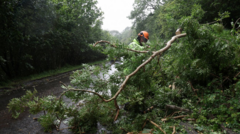Do Tighter Gun Restrictions Inspire Hope for a Safer Future?

New Firearms Licensing Laws: A Step Towards Safer Communities
The recent changes in firearms licensing laws in the UK have sparked hope for many families affected by gun violence. Emma Ambler, a Birmingham woman whose life was shattered by the tragic murder of her twin sister and two nieces, has become a vocal advocate for stricter regulations. The new legislation introduces significant amendments aimed at preventing incidents like the one that claimed her family. As these changes take effect, the question arises: can stricter gun laws truly lead to safer communities?
The Tragic Background
In 2020, Emma Ambler lost her sister, Kelly Fitzgibbons, and her two young nieces, Ava and Lexi Needham, to a horrific act of violence committed by Kelly's partner, Robert Needham. This tragic event not only devastated Emma's family but also highlighted significant gaps in the existing firearms licensing system. Needham, who had a history of dishonesty and mental health issues, was able to obtain a shotgun license through a flawed application process. This case underscores the critical need for reform in gun licensing laws to prevent future tragedies.
Key Changes in Firearms Licensing
The revised firearms licensing laws, effective from August 5, introduce several key changes aimed at enhancing the vetting process for shotgun certificate applications:
- Increased Referee Requirements: Applicants must now provide two referees instead of one, ensuring a more thorough evaluation of their character.
- Longer Acquaintance Period: Referees are required to have known the applicant for at least two years, increasing the likelihood of identifying potential red flags.
- Household Assessments: Police will now engage with the applicant's household members to check for signs of domestic abuse or other concerning behavior.
- Stricter Integrity Checks: Any evidence of dishonesty in the application process will severely impact the applicant's suitability for a firearms license.
- Background Checks: Enhanced scrutiny will be applied to individuals with a history of violence or mental health issues.
Emma Ambler's Advocacy Journey
Emma's personal tragedy has transformed her into a passionate advocate for gun law reform. She has dedicated her time to raising awareness about the flaws in the current system and pushing for legislative changes that could prevent similar tragedies. Emma expressed her relief that her efforts have not gone unnoticed, stating, “It’s the first time I’ve seen some changes that mean something.” Her persistence and emotional journey have been instrumental in bringing attention to the need for stricter gun control.
The Importance of Community Involvement
Community involvement plays a crucial role in the effectiveness of these new laws. By encouraging neighbors and family members to speak up about concerns regarding an individual’s suitability for a firearm license, communities can become active participants in ensuring safety. The new regulations emphasize the importance of collective vigilance, which can deter potential applicants with harmful intentions from obtaining firearms.
Learning from Past Tragedies
One of the driving forces behind the recent legal changes has been the tragic outcomes of past incidents, such as the Plymouth shootings in 2021, where gunman Jake Davison killed five people before taking his own life. The coroner's findings from these cases have shown that systemic failures allowed individuals with violent histories to obtain firearms. As more families face the devastating consequences of gun violence, the push for reform becomes even more critical.
The Role of Government and Policymakers
Policing Minister Dame Diana Johnson has reiterated the government's commitment to ensuring that only responsible individuals can access firearms. She emphasizes that law enforcement must possess comprehensive information about applicants to make informed decisions regarding their suitability. The government's stance is clear: any form of dishonesty in the application process should result in disqualification from obtaining a firearms license.
Future Directions for Firearms Licensing
As the Home Office continues to assess the effectiveness of the new regulations, there are plans for further improvements in firearms licensing. The government aims to consult with various stakeholders, including community organizations, to gather insights on enhancing existing controls and addressing loopholes in the system. This collaborative approach will be essential in shaping a more robust framework for firearms licensing.
Understanding Mental Health and Firearm Access
Mental health is a critical factor in determining an individual's eligibility for firearm ownership. The new regulations call for a more thorough assessment of an applicant's mental health history, particularly concerning depression or other serious conditions. By addressing these concerns, the law aims to prevent individuals who may pose a threat to themselves or others from obtaining firearms.
Public Awareness Campaigns
To support the implementation of these changes, public awareness campaigns will be necessary. Educating communities about the new regulations and the importance of mental health in relation to gun ownership will foster a culture of safety. These campaigns can empower individuals to recognize warning signs and encourage them to report concerns to local authorities.
Conclusion: A Step Towards Safer Communities
The recent changes in firearms licensing laws represent a significant step towards preventing gun violence and ensuring community safety. While these reforms may not eliminate all risks, they provide a stronger framework for evaluating applicants and addressing concerns before tragedies occur. Emma Ambler's advocacy and the collective efforts of policymakers highlight the importance of community involvement in promoting safety. As these new laws take effect, it’s crucial for individuals to remain vigilant and engaged in discussions about gun safety in their communities.
FAQs
What are the main changes in the new firearms licensing laws?
The main changes include an increase in the number of referees required for applications, longer acquaintance periods for referees, household assessments by police, stricter integrity checks, and enhanced background checks for individuals with a history of violence or mental health issues.
How do these changes affect community safety?
The changes are designed to enhance community safety by ensuring that individuals who pose a risk are less likely to obtain firearms. Increased scrutiny and the involvement of household members can help identify potential issues before they escalate into violence.
Why is Emma Ambler's advocacy important?
Emma Ambler’s advocacy is crucial because it sheds light on the personal impact of gun violence and emphasizes the need for legislative reform. Her efforts have contributed to meaningful changes in the firearms licensing process, which could prevent future tragedies.
As we reflect on these changes and their potential impact on gun violence prevention, it's worth considering: How can we further engage our communities in the fight against gun violence? #GunSafety #CommunityEngagement #FirearmsReform
```Published: 2025-08-04 23:49:11 | Category: technology



